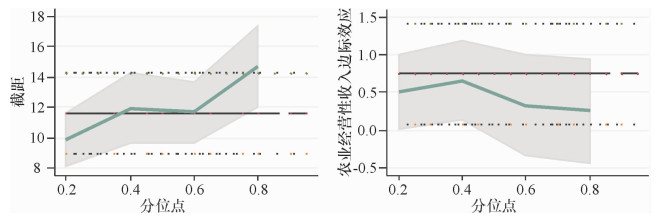The Impact of Non-agricultural Employment Experience on Agricultural Operating Income of New-type Professional Farmers
-
摘要: 新型职业农民农业经营性收入状况决定其发展前景。基于501份新型职业农民问卷调查数据, 探讨非农就业经历对新型职业农民农业经营性收入的影响及其作用机理。结果显示, 非农就业经历通过增强新型职业农民资源获取和整合能力, 既可以提高新型职业农民的农业经营性收入, 也有利于缓解新型职业农民间农业经营性收入差距。进一步分类检验结果显示, 非农就业经历对中、低收入水平新型职业农民具有显著农业增收效应; 年龄和农业经营规模等变量对新型职业农民农业经营性收入的影响各异。可见, 既要为具有非农就业经历劳动者从事农业生产经营扫清制度障碍, 也要采取有效措施激励并帮助新型职业农民将非农就业经历所积累的资本和能力转化为农业生产经营优势, 促进农业生产效率和农业经营性收入增长。Abstract: The agricultural operating income of the new-type professional farmers determines their development prospects. This paper aims to examine the impact of non-agricultural employment experience on the agricultural operating income of new-type professional farmers with 501 questionnaire survey data. The results show that, by enhancing the ability of new-type professional farmers to obtain and integrate resources, non-agricultural employment experience can not only increase the agricultural operating income of new-type professional farmers, but also help alleviate the agricultural operating income gap between new-type professional farmers.Resultsfrom further classification test indicate that the non-agricultural employment experience has a significant effect on the increase of agricultural income of new-type professional farmers at low and medium income levels. Variables such as age and scale of agricultural operations have different effects on the agricultural income of new-type professional farmers. It is necessary to clear the institutional barriers for agricultural production and management of laborers with non-agricultural employment experience, and also to take effective measures to encourage and help new-type professional farmers to convert the capital and capabilities accumulated by non-agricultural employment experience into agricultural advantages in production and operation, ultimately to promote agricultural production efficiency and agricultural operating income growth.
-
表 1 新型职业农民问卷调查基本情况(N=501)
类别 频数 占比(%) 类别 频数 占比(%) 地形特征 平原 114 22.75 扩大生产规模意愿 否 170 33.93 丘陵 139 27.74 是 331 66.07 山区 248 49.51 是否雇佣劳动力 否 118 23.55 实施标准农田建设 否 342 68.26 是 383 76.45 是 159 31.74 产品销售渠道稳定性 否 211 42.11 非农经历 否 122 24.35 是 290 57.89 是 379 75.65 带动农户就业 否 200 39.92 性别 女 132 26.35 是 301 60.08 男 369 73.65 接受过农业培训 否 188 37.52 文化程度 初中及以下 39 7.77 是 313 62.48 中专或高中 179 35.72 大专及以上 283 56.51 表 2 变量定义、赋值及其描述性统计结果
类别 变量 变量赋值 平均值 标准差 被解释变量 农业经营性收入(元,对数) 连续变量 13.22 3.274 核心解释变量 是否有非农就业经历 是=1;否=0 0.75 0.429 中介变量 资源获取与整合能力 主成分分析得分 -6.54e-10 1 控制变量 性别 女=1;男=2 1.73 0.441 年龄(岁) 连续变量 38.8 7.821 学历 初中及以下=1;中专或高中=2;大专以上=3 2.48 0.637 是否村组干部 是=1;否=2 1.19 0.398 从事农业生产年限(年) 连续变量 8.05 7.514 家庭从事农业生产人数(个) 连续变量 2.13 1.183 家庭农业经营面积(亩) 连续变量 508.4 2 058.387 地形特征 平原=1;丘陵=2;山区=3 2.26 0.807 表 3 非农就业经历对新型职业农民农业经营性收入的回归结果
变量 (1) (2) 系数 T值 系数 T值 非农就业经历 0.712* 1.95 0.754** 1.96 性别 -0.299 0.94 年龄 0.017 0.84 学历 -0.119 0.52 村组干部 -0.531 1.52 从事农业生产年限 0.027 1.29 家庭从事农业生产人数 0.208** 2.02 农业经营规模 0.000*** 3.43 地形特征 0.418** 2.19 常数项 12.68 38.65 11.61 9.11 注:*、**、***分别表示在10%、5%、1%的水平上显著。下表同。 表 4 非农就业经历对不同收入分位新型职业农民农业经营性收入影响的回归结果
变量 (1) (2) (3) q=0.25 q=0.50 q=0.75 系数 T值 系数 T值 系数 T值 非农就业经历 0.680*** 2.95 0.640** 2.07 0.299 1.00 性别 -0.147 0.80 0.002 0.01 -0.042 0.13 年龄 0.031* 1.64 0.016 1.17 -0.002 0.15 学历 0.031 0.14 -0.047 0.22 -0.013 0.07 村组干部 -0.369 0.96 -0.425 1.05 -0.442* 1.76 从事农业生产年限 -0.005 0.24 0.016 1.09 0.027 1.35 家庭从事农业生产人数 0.096 1.01 0.047 0.43 0.083 0.86 农业经营规模 0.000 0.56 0.000** 2.40 0.001*** 4.90 地形特征 0.278*** 2.85 0.188* 1.80 0.050 0.47 常数项 10.43 8.99 12.05 10.13 14.40 13.38 表 5 资源获取与整合能力的中介效应检验结果
变量 因变量 新型职业农民经营性收入 资源获取和整合能力 新型职业农民经营性收入 非农就业经历 0.712*(0.365) 1.432***(0.048) 0.365(0.478) 资源获取和整合能力 0.753***(0.178) 常数项 12.682(0.328) -1.083(0.013) 13.498(0.380) 样本量 501 501 501 注:*、**、***分别表示在10%、5%、1%的水平上显著,括号内为标准误。 -
[1] 宁波, 宋秀娟, 于兴业. 新型农业生产经营主体的发展约束与建议[J]. 江西社会科学, 2014(3): 52-57. https://www.cnki.com.cn/Article/CJFDTOTAL-JXSH201403010.htm [2] 罗明忠, 罗琦, 陈江华. 农业分工、资源禀赋与农村劳动力农业产业内转移[J]. 江苏大学学报: 社会科学版, 2018(2): 13-20. https://www.cnki.com.cn/Article/CJFDTOTAL-JSLD201802003.htm [3] 何瑛, 于文蕾, 戴逸驰, 等. 高管职业经历与企业创新[J]. 管理世界, 2019(11): 174-192. doi: 10.3969/j.issn.1002-5502.2019.11.014 [4] 冉璐, 谢家智, 张明. 非农工作经历与农民务农收入: 基于分位数回归与分解的实证研究[J]. 农业技术经济, 2013(6): 32-39. https://www.cnki.com.cn/Article/CJFDTOTAL-NYJS201306003.htm [5] 颜廷武, 张露, 张俊飚. 对新型职业农民培育的探索与思考——基于武汉市东西湖区的调查[J]. 华中农业大学学报: 社会科学版, 2017(3): 35-41, 150. https://www.cnki.com.cn/Article/CJFDTOTAL-HZND201703005.htm [6] 吕雅辉, 张润清, 张亮, 等. 新型职业农民培育"阳晨模式"研究[J]. 农业经济问题, 2018(11): 38-49. https://www.cnki.com.cn/Article/CJFDTOTAL-NJWT201811006.htm [7] 米松华, 黄祖辉, 朱奇彪. 新型职业农民: 现状特征、成长路径与政策需求——基于浙江、湖南、四川和安徽的调查[J]. 农村经济, 2014(8): 115-120. https://www.cnki.com.cn/Article/CJFDTOTAL-NCJJ201408023.htm [8] 陈建伟. 新型职业农民身份对农业经营收入的影响: 基于倾向值匹配方法的分析[J]. 东岳论丛, 2019(11): 162-173. https://www.cnki.com.cn/Article/CJFDTOTAL-DYLC201911017.htm [9] 蒋剑勇, 钱文荣, 郭红东. 社会网络、社会技能与农民创业资源获取[J]. 浙江大学学报: 人文社会科学版, 2013(1): 85-100. https://www.cnki.com.cn/Article/CJFDTOTAL-ZJDX201301013.htm [10] GALOR O, STARK O. Migrants'savings, the probability of return migration and migrants'performance[J]. International Economic Review, 1990, 31(2): 463-467. doi: 10.2307/2526851 [11] MA Z D. Urban labour-force experience as a determinant of rural occupation change: evidence from recent urban-rural return migration in China[J]. Environment and Planning A, 2001, 33(2): 237-255. doi: 10.1068/a3386 [12] 石智雷, 王佳. 外出务工经历与农村劳动力新技术获得[J]. 中南财经政法大学学报, 2013(2): 48-56, 159. doi: 10.3969/j.issn.1003-5230.2013.02.007 [13] 石智雷, 杨云彦. 外出务工对农村劳动力能力发展的影响及政策含义[J]. 管理世界, 2011(12): 40-54. https://www.cnki.com.cn/Article/CJFDTOTAL-GLSJ201112005.htm [14] 徐超, 吴玲萍, 孙文平. 外出务工经历、社会资本与返乡农民工创业——来自CHIPS数据的证据[J]. 财经研究, 2017(12): 30-44. https://www.cnki.com.cn/Article/CJFDTOTAL-CJYJ201712003.htm [15] 张鑫, 谢家智, 张明. 打工经历、社会资本与农民初创企业绩效[J]. 软科学, 2015(4): 140-144. https://www.cnki.com.cn/Article/CJFDTOTAL-XUXI201504030.htm [16] 马修·杰克逊. 社会位置决定命运[M]. 北京: 中信出版集团, 2019: 1. [17] KOLB D A. Experiential learning: experience as the source of learning and development[M]. Englewood Cliffs, New Jersey: Prentice Hall, 1984. [18] 乔治·吉尔德. 财富与贫困——国民财富的创造和企业家精神[M]. 北京: 中信出版集团, 2019: 271. [19] 张玉利, 杨俊, 任兵. 社会资本、先前经验与创业机会——一个交互效应模型及其启示[J]. 管理世界, 2008(7): 91-102. https://www.cnki.com.cn/Article/CJFDTOTAL-GLSJ200807012.htm [20] 道格拉斯·诺思. 经济史中的结构与变迁[M]. 上海: 上海人民出版社, 2000: 10-70. [21] 洪炜杰, 罗必良. 饥荒经历、地权偏好与农地调整[J]. 中国农村观察, 2020(2): 100-116. https://www.cnki.com.cn/Article/CJFDTOTAL-ZNCG202002007.htm [22] 道格拉斯·诺思. 理解经济变迁过程[M]. 北京: 中国人民大学出版社, 2013: 16-26. [23] HAYEK F A. The sensory order: an inquiry into the foundations of theoretical psychology[J]. Quarterly Review of Biology, 1999, 76(4): 182-183. [24] 邱海兰, 唐超. 农业生产性服务能否促进农民收入增长[J]. 广东财经大学学报, 2019(5): 100-112. https://www.cnki.com.cn/Article/CJFDTOTAL-SONG201905012.htm [25] 罗明忠, 唐超, 邓海莹. 从业经历与农业经营方式选择: 生产环节外包的视角[J]. 南方经济, 2019(12): 80-92. https://www.cnki.com.cn/Article/CJFDTOTAL-NFJJ201912007.htm [26] 罗明忠. 个体特征、资源获取与农民创业——基于广东部分地区问卷调查数据的实证分析[J]. 中国农村观察, 2012(2): 11-19. https://www.cnki.com.cn/Article/CJFDTOTAL-ZNCG201202002.htm [27] 石智雷, 谭宇, 吴海涛. 返乡农民工创业行为与创业意愿分析[J]. 中国农村观察, 2010(5): 25-37, 47. https://www.cnki.com.cn/Article/CJFDTOTAL-ZNCG201005003.htm [28] BARON R M, KENNY D A. The moderator-mediator variable distinction in social psychological research: conceptual, strategic, and statistical considerations[J]. Journal of personality and social psychology, 1986, 51(6): 1173. doi: 10.1037/0022-3514.51.6.1173 -





 下载:
下载:

